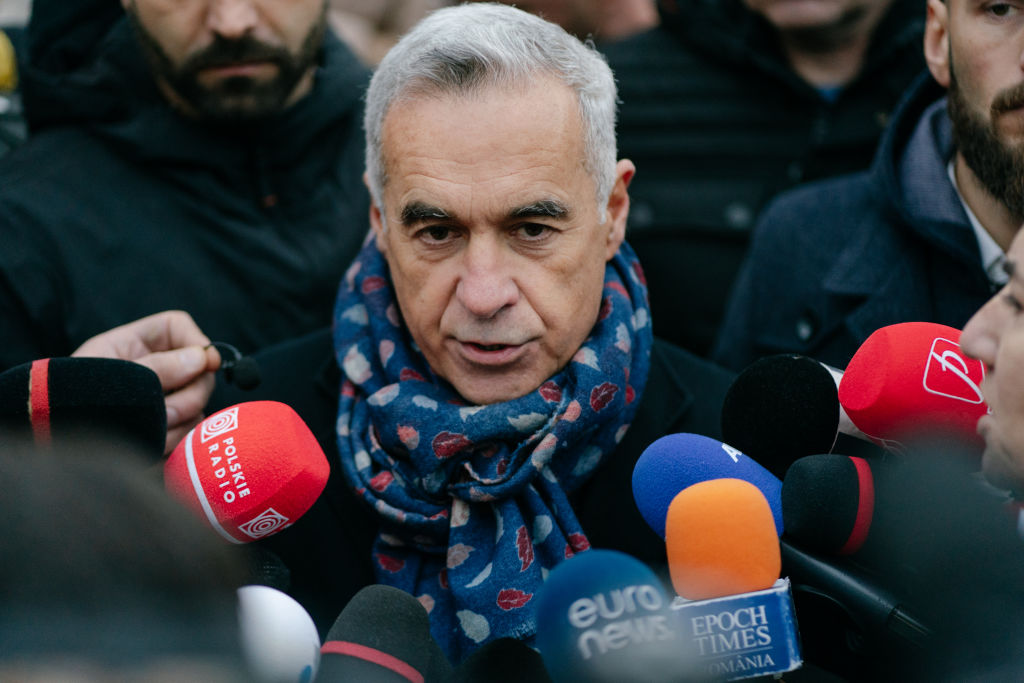To the great surprise of very few the European Court of Human Rights this week rejected an appeal by Calin Georgescu to overturn last month’s annulment of Romania’s presidential election. The Eurosceptic Georgescu had won the first round of November’s election, but days before the second round Romania’s Constitutional Court cancelled the result because of alleged Russian interference on social media. In its decision, the ECHR said that Georgescu’s appeal fell outside its jurisdiction.
That was the bad news for Georgescu. The good news was the publication of a poll this week that puts him firmly in front to win the election when it is re-run in May. He is forecast to take 38 per cent of the vote in the first round and then defeat his nearest rival, Crin Antonescu, in the second round to become president.
Europe’s elites seem to have no scruples with thwarting those with ‘wrong’ opinions from taking power
Antonescu has been selected as the candidate of the ruling coalition, that coalition being comprised of three pro-EU parties: the Social Democrats, the Liberals and the UDMR, which represents the Hungarian minority in Romania.
It would be a stretch to call Antonescu an inspired choice. A jobless history professor who has been out of political life for a decade, the 65-year-old Antonescu struggled to make his mark even when he was in his prime. From 2009 to 2014, he led the National Liberal Party and he was, for 48 days in 2012, the interim president of Romania after the suspension by parliament of Traian Basescu – a process initiated by Antonescu. Basescu challenged the ban and was quickly reinstated.
In a profile in 2014, Politico said Antonescu had ‘emerged a loser, with his image tarnished’. It described his rhetoric as ‘wild and shrill’ and his character as ‘confrontational and emotional’. Evidently, the Romanian electorate shared that view, and Antonescu’s ambition to run for the 2014 presidency was terminated when his Liberal party performed poorly at that year’s European elections and he resigned.
Thus ended Antonescu’s political career… or so he and Romania thought. Now he may finally fulfil his ambition to become president.
The polls suggest that Antonescu stands little chance of beating Georgescu, but he would if his rival was disqualified. That might happen. Speculation is growing that the Constitutional Court will intervene again, this time banning Georgescu from running ‘because of accusations of undeclared funding’.
It wouldn’t be the first time. In October, the nine-strong court invalidated the candidacy of Diana Sosoaca, the leader of SOS Romania, described as ‘a small ultra-nationalist Eurosceptic party’, which had won two seats in the European elections last June. The Court ruled that Diana Sosoaca was disqualified from running for president because she was incapable of respecting the country’s constitution and would threaten Romania’s membership of Nato and the EU.
‘This proves the Americans, Jews and the European Union have plotted to rig the Romanian election before it has begun,’ said Sosoaca by way of response.
The decision to exclude Sosoaca was criticised by her political rivals, who expressed concern that a dangerous precedent had been set. The centrist MEP Eugen Tomac declared that while he abhorred Sosoaca’s views ‘this kind of reckless politician should not be stopped using Putin-style methods’. Rather, he said, the democratic process should be allowed to run its course at the voting booth.
These actions by the Romania’s courts have reinforced the view among some Romanians – and shared by many millions across the EU – that Europe’s elites have no scruples with thwarting those with ‘wrong’ opinions from taking power. Look at the results in recent elections in Spain, Holland and France, where all of the winners were kept out of office by cobbled-together coalitions.
Earlier this month, Radu Magdin, a Romanian political analyst, said that what happened to Georgescu had harmed the country’s image in the eyes of the world: ‘In order to regain our clout as a serious country, we need a serious inquiry into what happened.’
At a speech at Davos on Tuesday, the EU Commission president, Ursula von der Leyen, touched on what Donald Trump’s ‘Golden Age’ might mean for Europe. ‘We will be pragmatic, but we will always stand by our principles,’ she declared. ‘To protect our interests and uphold our values – that is the European way’.
Does protecting the EU’s interests and values extend to turning a blind eye to electoral interference by politically-appointed courts in member states? If it does, then the EU, like Romania, doesn’t deserve to be taken seriously.








Comments